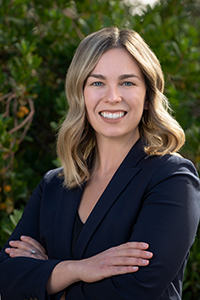Let’s Get to Work
New Workplace Law Club quickly finds a home (and a lot of support) on Boyd Law School campus

By Patrick Everson
Fledgling student-run organizations often need time to hit their stride, and understandably so, since collaborating with others to define objectives and ultimately achieve goals generally doesn’t happen overnight. But when an organization meets a previously unfilled need and has dedicated people in place, it can expedite the path to success.
Such has been the case for the Workplace Law Club, one of the newest organizations at the UNLV William S. Boyd School of Law. Founded during the Spring 2018 semester as an employment and labor law club, the group has made headway in a hurry as a natural fit for a school with a renowned Workplace Law Program.
In fact, the Workplace Law Club had such an impactful start that it was voted Boyd Law School’s best new club for 2019-20.
“People are interested in workplace law, generally,” says Theresa Thibeau, who is the club’s president for the 2020-21 school year. “One of the reasons I chose to attend the Boyd School of Law was because of its Workplace Law Program.”
After sorting out the logistics of creating a new club, the leadership team—led by President Erika Smolyar—shifted into event-planning mode to not only educate and inspire existing members but attract newcomers. Two of those events during the 2019-20 academic year were particularly enlightening, Thibeau says, in part because they addressed important and topical issues.
Along with the Organization of Women Law Students, the Workplace Law Club co-hosted a gathering in November 2019 that featured Nevada State Senator Pat Spearman as a guest speaker and focused on specific employment legislative reform pertaining to pay equity and equality. Then in February, the organization welcomed justice organizations from across the United States for the Alto Polimigra 2020 conference, which addressed concerns with immigration and customs enforcement practices and discussed ways to work together to support justice for migrant workers.
About a month after the conference, the COVID-19 pandemic hit. That slowed, but didn’t halt, the organization’s momentum. Recognizing that in-person events weren’t going to be possible, the group turned to technology to spread its message. In doing so, it was able to engage a broader audience, promoting Zoom events, such as a September seminar about ethics and civility within employment and labor law.
“We had attorneys who are labor and employment law specialists from California, Reno, and Las Vegas,” Thibeau says. “Because people don’t have to commute, they seem to be more willing or able to be involved.”
Another way in which the Workplace Law Club has been able to press forward: stability within the leadership ranks. While Thibeau has taken over as president, her predecessor, Smolyar, stuck around as vice president. Also, Joey Adamiak, who served as vice president of community relations and fundraising last year, has assumed the role of treasurer, and Edmond Bennett is in his second year as student liaison, promoting events and sharing the club’s mission with fellow part-time students.
Working together from a distance, the team remains committed to accomplishing the objectives highlighted on the club’s 2020-21 agenda. This includes developing a mentorship program designed to connect Boyd Law School students with practicing attorneys all over the country who would be willing to provide support, institutional wisdom, and—potentially—career opportunities.
“We hope to be able to reach attorneys across the U.S.,” Thibeau said. “That’s potentially nice for people who don’t want to remain in Las Vegas but would like to have connections across the country and learn about opportunities in both employment and labor law [in other jurisdictions].”
Despite its relative infancy, the Workplace Law Club—for which Boyd Law School professors Ann McGinley and Ruben Garcia serve as faculty advisers—has proven to be a big hit with the student body: The club has attracted 60 members, including 22 who joined during the Fall semester.
To Thibeau, the club’s popularity makes sense.
“At some point in your life, you’re going to be employed or employing other people,” she says. “Which means in one way or another, we’re all going to deal with employment or labor law in some fashion.”